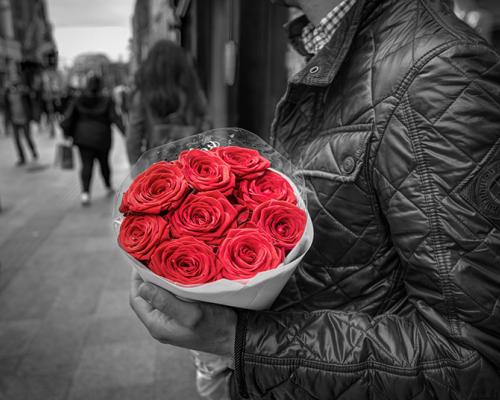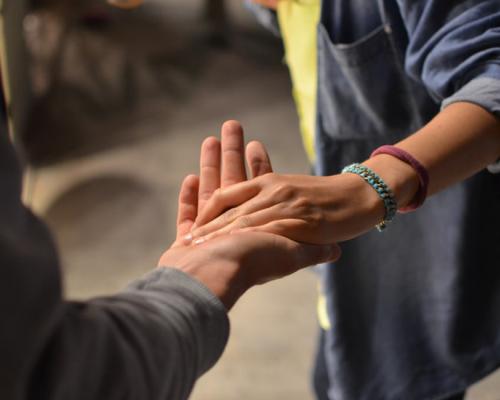“I was Angela long before I became a self-harmer”
CASE STUDY
Self-harm is still a taboo subject. Angela shares her experience of self-harm and the impact it had on her life before taking the first steps to recovery.
“TODAY I am going to talk about self-harm and how different methods of dealing with it by professionals have affected me. Self-harm is still a taboo subject, but I have tried to be very honest in what I am saying. I can’t remember when I first started self-harming; it is just one of those things in a long line of events that are muddled up in my mind with no time scale to go by, because everything seems to blend together. Why do I do it? People do it for many different reasons. For some, it is a way of making people pay attention to them, but I don’t think this is my reason because I rarely tell anyone that I have done it. It’s a secret between me and my razor.
It’s a way of relieving the stress that has built up inside me. Sometimes I know why I am feeling stressed and sometimes, only sometimes, I am able to work through it without self-harming by keeping my hands busy by making cards or doing crosswords or reading. This also stops me thinking about self-harming because I am thinking about what I am doing and it can help relieve the pressure. But, sometimes, the feeling comes from nowhere and the feeling is so overwhelming that it will not go until I have self-harmed.
It is at these times that being prevented from self-harming can be very negative, as the need just builds up and up, until at the first opportunity you self-harm and usually end up self-harming a lot worse than if you had been allowed to do it at the beginning, when you were more in control of the situation. Sometimes you can even end up being suicidal, because you feel your life is out of your control and there seems little point in continuing living.
The reason for these feelings is not always evident and even afterwards I do not know where they came from. They are buried too deep inside me.
At first, it is really scary being given back that control, especially if you have spent long stretches of time in places that take all control away from you (such as hospital), but it is the only way forward if you are to cope with living in and being part of the community.
Sometimes we have these feelings because we feel we no longer matter; we no longer have a place in the world of so-called normal people. The one thing that most self-harmers have in common is that they have very little or no self-esteem or confidence. Maybe we feel that our bodies, like our feelings, are worthless: that, by self-harming, we are somehow making our bodies equal with our minds because, to us, they are ugly. Our thoughts are bad and we feel that our bodies are as well. It is a way of telling people to beware of us because we don’t fit in with society’s views of how people should think and behave.
People are very quick to condemn and isolate things that don’t comply to the ‘norm’. Because they cannot see mental illness they put everyone in one pigeonhole, as if we are all going to be axe murderers and in the end we believe there is something wrong with us. I cannot hurt other people, so I hurt myself [but] thereby perpetuate that view in society that I am dangerous. After all, if I can pull a razor through my own skin, what’s to stop me doing it to someone else?
But we also self-harm because, when we draw blood, it somehow removes all the pressure in our heads, sometimes just for hours, sometimes for days or weeks. People, including mental health professionals, put us into little boxes. I am a ‘self-harmer’ – but I am also Angela and I was Angela long before I ever became a self-harmer. Here, in the house, I am Angela first and I wish the philosophy of the house could be bottled up and given to all professionals, and especially to all students who are starting with a blank slate, because this is the way forward in mental health – to give people back their status in life and then perhaps end that overwhelming need to mutilate ourselves because we end up feeling that what everyone else thinks of us is true. We can begin to feel that we are people again and not just second-class citizens.
In the house, we are people with a status and the staff look beyond the self-harm and the negative behaviour and try to find the individual you once were and help you achieve some of the things you used to do. You might never be able to do all the things you used to do, but they teach you new skills, new ways of coping with life and, most important of all, they try to help you like yourself again. It’s a long bumpy road but, as you begin to like yourself a bit more, the incidents of self-harm do lessen. They might never go away completely but you are reminded that just because you took a step backwards today doesn’t mean that tomorrow will be the same. You are reminded of the good days you have had and often all you need is that little reminder and you feel that maybe, just maybe, there is hope; there is a way out of this self-mutilation because you are being given back your life in a way you can cope with.
Taking the first few steps is the hardest but they do say that the longest journey starts with the first step – and I think I have made that step.”
Angela Western
Overcoming Self-Harm
With the right help and support most people who self-harm can, and do, fully recover over time – Emily Gajewski's inspiring 1-day workshop shows you how…
View course information >
Latest Tweets:
Tweets by humangivensLatest News:
HG practitioner participates in global congress
HG practitioner Felicity Jaffrey, who lives and works in Egypt, received the extraordinary honour of being invited to speak at Egypt’s hugely prestigious Global Congress on Population, Health and Human Development (PHDC24) in Cairo in October.
SCoPEd - latest update
The six SCoPEd partners have published their latest update on the important work currently underway with regards to the SCoPEd framework implementation, governance and impact assessment.
Date posted: 14/02/2024












